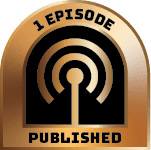 Podcasting is an essential tool in today’s digital landscape and is experiencing dynamic growth across many industries. As an engaging and interactive media channel, podcasts offer a vibrant space for thought leaders, brands and entertainers to connect with a broader audience. One may wonder then, “How to launch a podcast?” We’ll help walk you through it. Also consider skipping a few steps with Blubrry’s Concierge Services, where you provide us with the details for your new show, and we get your website set up and ready.
Podcasting is an essential tool in today’s digital landscape and is experiencing dynamic growth across many industries. As an engaging and interactive media channel, podcasts offer a vibrant space for thought leaders, brands and entertainers to connect with a broader audience. One may wonder then, “How to launch a podcast?” We’ll help walk you through it. Also consider skipping a few steps with Blubrry’s Concierge Services, where you provide us with the details for your new show, and we get your website set up and ready.
A crucial step budding podcasters must consider is establishing a podcast website as part of their podcast publishing strategy. In the digital age, how you present your podcast is nearly as important as the content you create. Establishing a podcast website can be an effective way to:
- Host your episodes
- Share additional resources, such as show notes and presenter/guest bios
- Facilitate engagement with your audience
- Promote any products or services that you offer
So, how exactly does one create a podcast website and integrate it into their podcasting publishing strategy?
The first step would be to choose a reliable hosting provider. Just as a high-quality microphone is essential for sound clarity, a competent hosting provider ensures the smooth delivery of your podcasts to various directories. Remember, your chosen hosting platform significantly impacts how you publish a podcast, so consider the tools, support and packages they offer.
Next, consider the design and organization of your podcast website. Podcasters often overlook this aspect in the excitement of their podcast launch. Make sure it reflects your brand and is easy to navigate. In today’s fast-paced world, user-friendliness is king, and a well-organized site can determine whether a visitor stays to listen or clicks away. Here are tips on designing and presenting art on your podcast’s website.
Once your website is set up and your content is ready, it’s time for your podcast launch! Be prepared for promotional activities like social media marketing, strategic collaborations, and email marketing to get the word out efficiently.
The aspects discussed are a solid start for the foundation of your podcast. Podcasting is filled with continuous learning, growth and innovation, and the podcast industry is changing at an unprecedented rate.
Creating a Podcast
 With deliberate planning, audience targeting and proficient podcast editing, the end product of podcast creation can resonate profoundly with the right people, leaving them wanting more.
With deliberate planning, audience targeting and proficient podcast editing, the end product of podcast creation can resonate profoundly with the right people, leaving them wanting more.
The initial and perhaps most crucial step in creating a podcast is planning your episodes. Proper planning sets the stage for a successful podcast by outlining what:
It also involves an evaluation of your podcast’s target audience. Who are they? What are their interests or challenges? What type of content appeals to them? Armed with these insights, you can tailor the content and format of your podcast to your audience’s specific needs and interests.
Once the groundwork is set, the next step is to record your podcast episodes. Technology has made the podcast recording process less complicated and more accessible, with various equipment and software options available. However, choosing the right tools, understanding their functionality, and mastering the art of audio capturing are critical aspects that require a deeper understanding. Creators need to learn about these tools to enrich their podcast’s audio quality because poor sound can scare away listeners!
While planning and recording your podcast is essential, the art of packaging your content so it smoothly and captivatingly reaches your audience cannot be overlooked. This process is known as podcast formatting. The introduction, main section, and end segment are the core ingredients in creating a well-executed podcast episode. A compelling introduction intro draws in your audience, while the main section keeps them engaged. Finally, a fitting conclusion solidifies the theme and topics in your episode.
As a podcaster, your duty does not end at formatting. Podcast editing is integral in delivering a seamless and professional episode. While it might seem daunting for beginners, with patience and diligent practice, podcast editing can become second nature. The latest editing tools eliminate awkward silences, unnecessary comments, or anything that interrupts the flow.
In essence, careful planning, audience analysis, proficient recording, strategic formatting, and meticulous editing can result in a podcast that not only piques the interest of listeners but keeps them coming back for more. Understanding the unique value of each of these steps will make the process of creating a podcast less overwhelming and more fulfilling.
Publishing a Podcast
 With the expansion of technology and the growing appetite for audio content, podcasting has become a popular medium for individuals and businesses to share their messages with a broader audience. Essential components of creating a successful podcast involve:
With the expansion of technology and the growing appetite for audio content, podcasting has become a popular medium for individuals and businesses to share their messages with a broader audience. Essential components of creating a successful podcast involve:
- Choosing the right podcast hosting platform
- Mastering the art of podcast distribution
- Incorporating podcast publishing software
- Understanding where to publish a podcast
Choosing a hosting platform, such as Blubrry, is the first pivotal step in launching a podcast. Selecting the ideal platform will have significant implications for the scalability and sustainability of the podcast. A notable hosting platform simplifies the technical aspects of podcasting for beginners while offering advanced features for the seasoned broadcaster. Most importantly, your hosting platform should offer comprehensive stats that help you understand your audience better.
Next is mastering the art of podcast distribution, which involves ensuring that your podcast is accessible on various platforms that your potential listeners may use. Major players in podcast distribution include Google Podcasts, Spotify, and Apple Podcasts. Each platform has its unique steps for podcasters to follow. For instance, to upload a podcast to Apple, one needs to use Podcasts Connect, an online platform for handling podcast RSS feeds. You’ll need key information, such as your RSS feed, a show summary, and artwork for your podcast.
Podcast distribution isn’t limited to audio platforms only. Many podcasters also upload podcasts to tools such as YouTube, personal blogs, or websites. This multi-platform approach guarantees that there’s no stone left unturned when reaching as many listeners as possible. The hosting platform should also allow straightforward integration with your show website.
Another fundamental process in podcasting is publishing. Advanced podcast publishing software will enable you to easily upload your audio file, write a show description, and add tags. Your chosen hosting platform should have an easy-to-use interface to publish your podcast, too.
Finally, understanding where to publish a podcast is also part of your podcast’s success. Aside from the usual audio platforms, consider networks specific to your niche or industry. There are numerous directories in different categories that you can take advantage of.
Remember that the podcasting process doesn’t end after hitting publish. You need to actively promote your podcast and engage with your listeners. Monitor your analytics to understand what works best and what needs to be improved. Be consistent, keep improving, and, most importantly, keep sharing your valuable message. Podcasting can seem daunting at first, but with the right approach, it can be an immensely rewarding venture.
Growing and Monetizing a Podcast
 As a podcaster, a significant focus might be placed on growing and monetizing a podcast. The podcast landscape is brimming with unlimited potential, allowing audiences worldwide to connect with your content. However, navigating the intricate aspects of podcasting growth and monetization can prove challenging.
As a podcaster, a significant focus might be placed on growing and monetizing a podcast. The podcast landscape is brimming with unlimited potential, allowing audiences worldwide to connect with your content. However, navigating the intricate aspects of podcasting growth and monetization can prove challenging.
Content Quality
Superior content quality is integral for your podcast’s success. It is pivotal for perfecting different aspects of your podcast, including audio quality, script writing, and content relevancy.
Consistency
Consistency is crucial in building a loyal audience base. Publishing episodes regularly will retain your audience’s interest and allow for constant interaction with your content.
Audience Engagement
Audience engagement plays a significant role in podcast growth. Active social media presence, T-shirt giveaways, live Q&A sessions, and soliciting feedback from listeners are great ways to interact with your audience. Remember, a dedicated and engaged listener is more likely to share your podcast, expanding its reach organically.
Promotion
Promotion, through both social media and leveraging SEO practices, plays a vital role in expanding your reach beyond your current audience. Utilizing unique, podcast-based hashtags and catchy episode titles will improve podcast visibility and pique audience interest.
Sponsorships
Sponsorships offer the most popular monetizing option. Podcasters can collaborate with companies for ad placements within their episodes and generate income. Nonetheless, it’s critical to partner with brands that resonate with your podcast’s audience. This not only attracts sponsors but also helps retain listenership.
Donations
Podcast donations or crowdfunding, such as through Patreon or Value4Value, involve listeners directly contributing to your podcast. Patreon and Kickstarter are common platforms where listeners can donate to your cause.
Promotional Merchandise
Selling merchandise and other podcast-related products presents another monetization avenue. Not only does this generate income, but it also helps promote the podcast.
Premium Content
The concept of premium content involves making exclusive podcast content available to subscribers for a charge. That could involve ad-free episodes, bonus material, or early access to episodes.
Overall, growing and monetizing a podcast is a multifaceted process requiring strategic planning and effective execution. Blubrry’s unparalleled suite of tools and services is designed to help podcasters navigate this process and maximize their podcast’s potential. From detailed analytical statistics to marketing and hosting facilities, Blubrry enables podcasters to optimize growth and profitability effectively.




